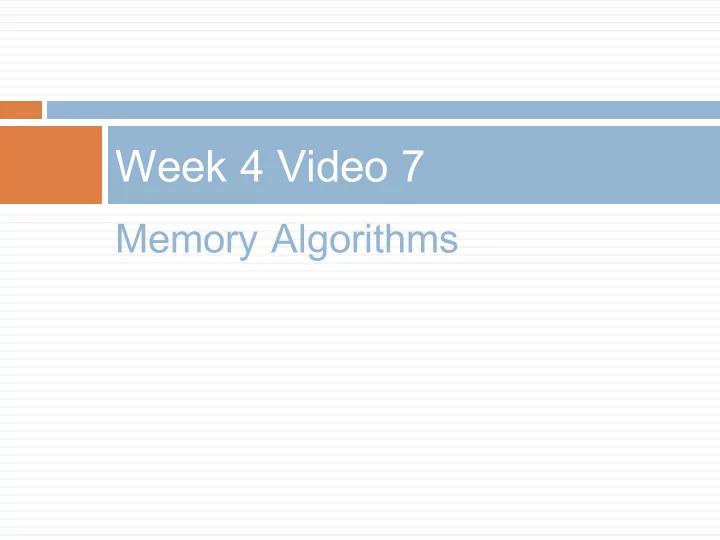

Week 4 Video 7 Memory Algorithms
Is future correctness enough? ◻ Up until this point we’ve been talking about predicting future correctness
But what if you forget it tomorrow? ◻ Another way to look at knowledge is – how long will you remember it?
Relevant for all knowledge ◻ Mostly studied in the context of memory for facts, rather than skills ◻ How do you say banana in Spanish? ◻ What is the capital of New York? ◻ Where are the Islands of Langerhans?
Spacing Effect ◻ It has long been known that spaced practice (i.e. pausing between studying the same fact) is better than massed practice (i.e. cramming) ◻ Early adaptive systems implemented this behavior in simple ways (i.e. Leitner, 1972)
ACT-R Memory Equations (Pavlik & Anderson, 2005) ◻ Memory duration can be understood in terms of memory strength (referred to as activation)
ACT-R Memory Equations (Pavlik & Anderson, 2005) ◻ Formula for probability of remembering % ◻ 𝑄 𝑛 = ()* %&' + ◻ Where m = activation strength of current fact ◻ τ = threshold parameter for how hard it is to remember ◻ s is noise parameter for how sensitive memory is to changes in activation ◻ Note logistic function (like PFA)
ACT-R Memory Equations (Pavlik & Anderson, 2005) ◻ Formula for activation , 34 ◻ 𝑛 , 𝑢 %…, = ln ∑ 𝑢 2 25% ◻ We have a sequence of n cases where the learner encountered the fact ◻ Each 𝑢 2 represents how long ago the learner encountered the fact for the i-th time ◻ The decay parameter d represents the speed of forgetting under exponential decay
ACT-R Memory Equations (Pavlik & Anderson, 2005) ◻ Implications ◻ More practice = better memory ◻ More time between practices = better memory ◻ Most efficient learning comes from dense practice followed by expanding amounts of time in between practices (Pavlik & Anderson, 2008)
MCM (Mozer et al., 2009) ◻ Postulates that decay speed drops, the more times a fact is encountered ◻ Functionally complex model where ◻ Knowledge strength (and therefore probability of remembering) is a function of the sum of the traces’ actual contributions, divided by the product of their potential contributions ◻ Power function is estimated as a combination of exponential functions
DASH (Mozer & Lindsay, 2016) ◻ DASH Extends previous approaches to also include item difficulty and latent student ability ◻ Can use either MCM or ACT-R as its internal representation of how memory decays over time
Duolingo (Settles & Mercer, 2016) ◻ Fits regression model to predict both recall and estimated half-life of memory (based on lag time) ◻ Based on estimate of exponential decay of memory
Duolingo (Settles & Mercer, 2016) ◻ Uses feature set including ◻ Time since word last seen ◻ Total number of times student has seen the word ◻ Total number of times student has correctly recalled the word ◻ Total number of times student has failed to recalled the word ◻ Word difficulty
Another area of active development ◻ Watch this space, approaches rapidly changing ◻ Recent emerging approaches have not yet gone “head to head” against each other
Next Week ◻ Relationship Mining
Recommend
More recommend